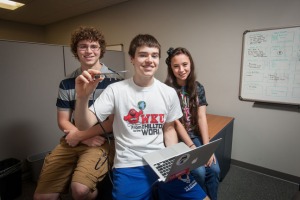Biology
Gatton Academy students work to develop app using Google Glass
- Wednesday, July 9th, 2014
For three Gatton Academy students, this summer’s coolest eyewear isn’t found on a beach; it’s found at the Department of Computer Science in WKU’s College High Hall.

Gatton Academy students (from left) Logan Houchens, Peter Kaminski and Lydia Buzzard are working on a summer research project using Google Glass. (WKU photo by Clinton Lewis)
The students – Lydia Buzzard of Hopkinsville, Logan Houchens of Crestwood and Peter Kaminski of Owensboro – are working under the mentorship of Dr. Uta Ziegler, professor of Computer Science, to develop an app for WKU using Google Glass.
The emerging wearable computer technology, which was unveiled and released to developers in 2012, is being released to consumers this year.
Dr. Ziegler said wearable technology is the latest step for computers that have progressed from large mainframes to desktops to laptops to smartphones and now to products like Google Glass.
“Logan wanted to do something with Google Glass and came up with the idea to develop a WKU app,” Dr. Ziegler said.
“When I came up with the idea for the app, I wanted an app that students could access to make campus life easier,” Houchens said. “I see Glass as more of an educational tool. I see it flourishing in the classroom or on campus.”
Before the students could start compiling information to make campus life easier, they had to learn more about the programming and coding necessary for Google Glass. Then they had to work with WKU’s Information Technology Division to gather information that’s available on the WKU website or the iWKU app, such as transit schedules and parking information, dining facility schedules and meal plan information, computer lab information and campus directions, and WKU events and WKU News.
“I referenced the iWKU app because it’s so useful and I thought what if I could put that on Google Glass,” Houchens said.
Dr. Ziegler said the research portion of the students’ project includes Human Computer Interface as they determine the best way to organize and present information.
“One key is what can be done fast,” she said. “You don’t want to do anything that takes five minutes. How can you make interactions faster?”
In their research project summary, the students note: “Google Glass has the advantage of instant accessibility over typical mobile devices because it is worn rather than carried by the user. This dramatically decreases the amount of time necessary to complete an interaction with a mobile device. In our research, we are aiming to further decrease interaction time with Glass by writing an application that is both functional and logical. The app is made for students — specifically, students at WKU — and shortens interaction time by including factors such as user context and selections from previous uses of the app into its algorithms during subsequent uses. We will be comparing this ‘smart’ version of the app with a ‘standard’ version to study whether or not our strategies to shorten interaction time with a device make for a better user experience.”
The students plan to submit a research paper on the project to the Siemens Competition in Math, Science & Technology.
Kaminski said Gatton Academy students are required to take computer programming classes as an introduction to computer science, but noted that the Google Glass project has given the three students an opportunity to apply those skills outside of the classroom. “That’s pretty awesome,” he said.
Buzzard said she never expected to be working on a project like Google Glass. “I’m pretty excited,” she said.
“Computer science and programming are important dimensions in the Gatton Academy curriculum,” said Derick Strode, Assistant Director of Academic Services at the Gatton Academy. “These three students are taking newly acquired skills and applying them to an emerging technology that the entire WKU community can use soon.”
Since Google Glass is new technology, the project has given the students an opportunity to make discoveries on their own and face challenges along the way.
“There’s a whole host of things you learn,” Dr. Ziegler said. “It all has to fit together to work and you don’t get that in class.”
The students, who are members of the Gatton Academy’s Class of 2015, are among 20 students whose research activities are supported by the Gatton Research Internship Grant, an annual summer program funded by a gift from C.M. “Bill” Gatton.
Even though the project ends in mid-July, Dr. Ziegler said there’s plenty of work ahead and hopes the students will continue working on the app this fall.
While research is an important part of the Gatton Academy experience, Houchens encourages all WKU students to take advantage of opportunities for hands-on projects with faculty members. “Research is a good opportunity to build on the curriculum and experiences,” he said. “The Gatton Academy has taught us that research is the next step for people who want to set themselves apart.”
About the Gatton Academy: Established in 2007, the Gatton Academy is Kentucky’s high school for gifted and talented junior and seniors. Gatton Academy students enroll early as full-time WKU students to pursue their interests in advanced science, technology, engineering and mathematics careers. Newsweek named the Gatton Academy the number one public high school in the United States in 2012 and 2013.
Contact: Derick Strode, (270) 745-3167; or Uta Ziegler, (270) 745-2911.
Some of the links on this page may require additional software to view.

